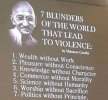Ow, tricky, from a Roman Catholic point of view.
Reference from history is rare, as really from about the 6th century on, the Church increasingly becomes part of the Establishment.
In contemporary times, you have 'Liberation Theology' focussed on South America. I wouldn't advise a 15-year-old to read the theologians or the theological debate, though ... you'd want a 'Liberation Theology for Dummies' or 'Made Simple' ... I'm not sure where you'd find a simple view?
In short the RCC has always been against the use of violence against the state. The RCC is institutionally hierarchical, so is always deeply suspicious of any movement of 'the people' against 'the establishment' because they see themselves as an 'establishment' (THE Establishment, the Archetypal hierarchy).
Cardinal Ratzinger opposed Liberation Theology as a Marxist interpretation of the Gospel. Pope Francis was against it, then changed, and now endorses it in principle, on the basis that the Gospel is socialist, it's Marxist before Marx, or maybe Marx is the gospel with God stripped out?
Dietrich Bonhoeffer (Lutheran) was anti-Nazi, but the Church was institutionally neutral (whereas the priesthood was not) — the Jesuits were on the list to be dealt with once the 'Jewish Problem' had been 'solved'.
The Church's stance towards the Nazis was shaped by the lesson of Rome's decision to excommunicate Elizabeth I. As a policy it backfired, because now the Church had taken a stance against the Crown, Catholics could be executed not for heresy (which the population had grown tired of) but for treason, a state crime, which the public in its anti-invasion fervour was only too happy to embrace. The number of Catholics killed during Elizabeth I's reign escalated significantly, as to be Catholic was de facto against the Crown — there was no theological defence. It was assumed Hitler would simply add Catholics to the Jews if the Church declared an obligation on Catholics to morally resist Nazism.
Any more help I can offer, let me know.

